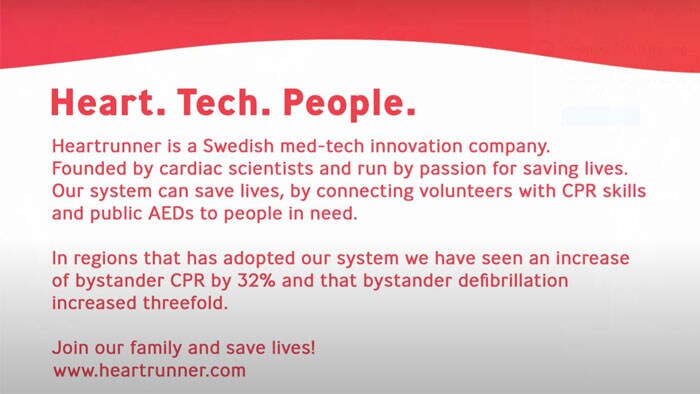Cardiovascular disease kills up to 17 million people a year and is the number 1 killer in the world (Source: 2017, Cardiovascular diseases, World Health Organization). We know what is necessary to save more lives – for the best chance of survival from cardiac arrest, a shock from a defibrillator (AED) and cardiopulmonary resuscitation (CPR) should be delivered within the first few minutes of collapse. This means that there is a need to increase the number of easily accessible AEDs in our communities, to make sure that they are getting to use, and increase the number of CPR educated citizen responders.
In the event of a cardiac arrest, the chance of surviving decreases by 10% for each minute without life-saving efforts, therefore quick help is paramount while waiting for an ambulance. Portable AEDs can restore a normal heart rhythm in victims of sudden cardiac arrest. But most of us do not know where the nearest AED is when an accident occurs, or even what to do to help. That's why Philips is joining forces together with Heartrunner that has developed a system, in Sweden known as Sms-livräddare and in Denmark as TrygFonden Hjerteløber, to ensure that CPR educated citizen responders find the closest defibrillator and the person suffering from cardiac arrest. The most sold AED brand in the world With two-million AEDs sold around the world, Philips AEDs can be found on board major airlines, shopping malls, office buildings, and in locker rooms of professional sports teams. Despite the fact that the number of public defibrillators has increased in recent years, only one in ten survive a cardiac arrest outside a hospital.
We believe that both increased availability of AEDs in our communities and knowledge on how to use them and perform CPR would save many lives!
Nille Klaebel
Vice President, Philips Nordic
Heartrunner is a system for volunteer recruitment If the location or functionality of deployed AEDs are unknown, their lifesaving potential is lost. Heartrunner is the link between these AEDs and the victims of cardiac arrest. Via dispatch centers, citizen responders with knowledge in CPR are notified when help is needed nearby. They receive a map to the nearest AED and to the victim. The system is an invaluable help at the early and crucial stage for those who suffer from cardiac arrest. We need a stronger presence of these citizen responders, who in combination with more AEDs will save more lives.
An unused AED does no good and we continuously work to increase use of the AEDs out there to increase survival. And it is not just us who say that this is important. The international organization ILCOR recommends systems where citizen responders are alerted in the vicinity of a cardiac arrest. In a recently published study from Denmark, where our system is used nationwide, citizen responders were on site before ambulance in over 40% of cases and the use of AEDs tripled – and this is what we want, more saved lives!
David Fredman
PhD and operations manager at Heartrunner
Video: See how Mats survived a cardiac arrest when Heartrunner citizen responder Ida-Marie helped!
More important than ever Even now, during covid-19, it is important to make life-saving efforts. The European Resuscitation Council (ERC) has published recommendations for how CPR should be performed during the ongoing corona epidemic. If covid-19 is suspected or confirmed, citizen responders should refrain from rescue breaths and only do chest compressions. Read more at the Norweigan CPR Council (ERC) about what applies in accordance with science and international guidelines.
Share on social media
Topics
Author

Henriikka Halinen Business Marketing & Sales Leader Connected Care Tel: +358 (40) 4822558













